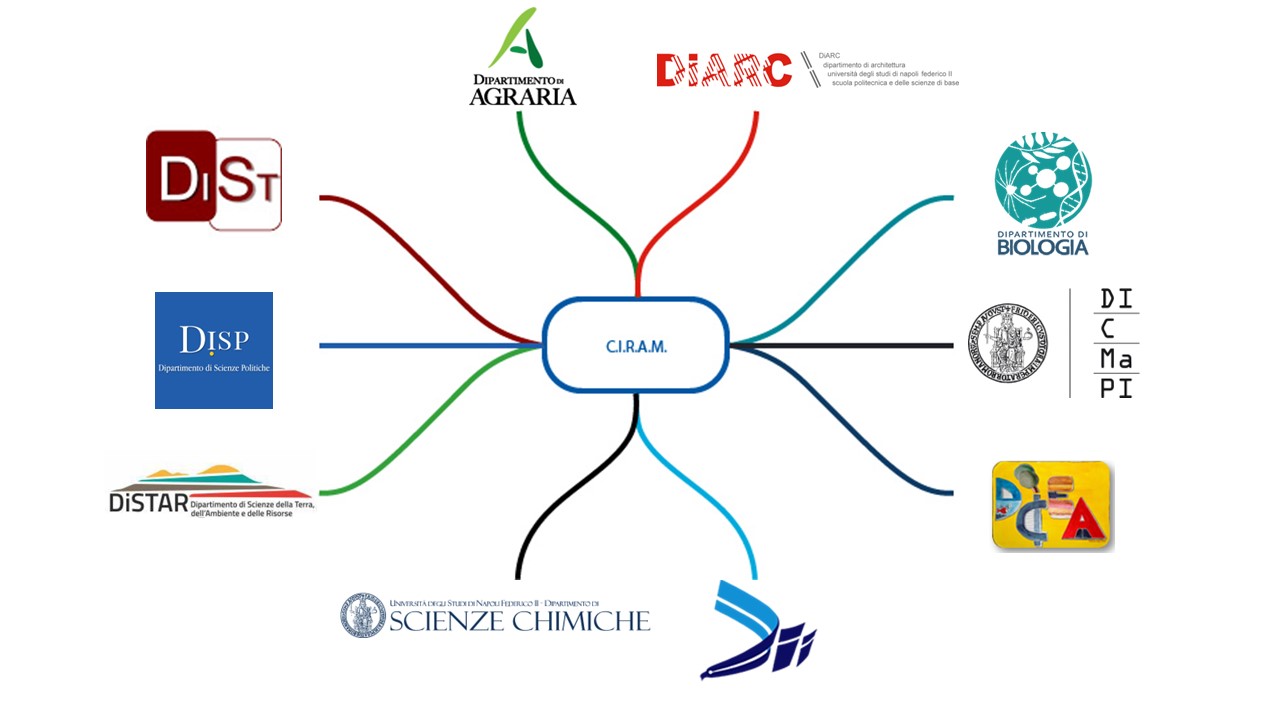- ciram@unina.it
- Lun-Ven | 8 -17
Gruppi Tematici
ORGANIGRAMMA
|
DIRETTORE |
Prof. Giulia GUERRIERO |
|
081-2534644 |
BIOLOGIA |
|
VICE DIRETTORE |
Prof. Massimo FAGNANO |
|
081-2539129 |
AGRARIA |
|
SEGRETARIO AMMINISTRATIVO |
Dott. Anna Maria Eleonora Rosaria INTRAVAJA |
|
081-2539155 |
AGRARIA |
GIUNTA
|
Direttore: Prof. Giulia GUERRIERO Vice Direttore: Prof. Massimo FAGNANO Segretario Amministrativo: Dott. Anna Maria Eleonora Rosaria INTRAVAJA Rappresentanza interdipartimentale: |
||
| Dipartimento di Agraria | Prof. Fabrizio SARGHINI | |
| Dipartimento di Architettura |
Prof. Maria Rita PINTO
|
|
| Dipartimento di Biologia | Prof. Simonetta GIORDANO |
|
| Ingegneria Chimica dei Materiali e della Produzione Industriale | Prof. Domenico PIROZZI |
|
| Ingegneria Civile, Edile e Ambientale | Prof. Massimo RAMONDINI | |
| Dipartimento di Ingegneria Industriale |
Prof. Massimo DENTICE d’ACCADIA
|
|
| Dipartimento di Scienze Chimiche | Prof. Mauro IULIANO | |
| Dipartimento di Scienze della Terra, dell’Ambiente e delle Risorse |
Prof. Vincenzo ALLOCCA
|
|
| Dipartimento di Scienze Politiche | Prof. Lucia SIMONETTI | |
| Strutture per l'Ingegneria e l'Architettura | Prof. Francesco MAROTTI DE SCIARRA | |
CONSIGLIO DI GESTIONE |
||
| Dipartimento di Agraria | ||
| Prof. Massimo FAGNANO | ||
| Prof. Nunzio ROMANO | ||
| Prof. Fabrizio SARGHINI | |
|
| Dipartimento di Architettura | ||
| Dipartimento di Biologia | ||
| |
||
| Dipartimento di Ingegneria Chimica dei Materiali e della Produzione Industriale | ||
| Prof. Antonio MARZOCCHELLA | ||
| Dipartimento di Ingegneria Civile, Edile e Ambientale | Prof. Francesco PIROZZI | |
| Prof. Massimo RAMONDINI | |
|
| Prof. Andrea D'ANIELLO | ||
| Prof. Giovanni FORTE | ||
| Prof. Francesco PUGLIESE | ||
| Dipartimento di Ingegneria Industriale | ||
| Dipartimento di Scienze Chimiche | ||
| Dipartimento di Scienze della Terra, dell’Ambiente e delle Risorse | ||
| Prof. Diego DI MARTIRE | ||
| Dipartimento di Scienze Politiche | ||
| |
||
| Dipartimento di Strutture per l'Ingegneria e l'Architettura | ||
| Dipartimento di Studi Umanistici | |
|
History of the Center
The C.I.R.AM. was activated starting from 01/09/1992 on the initiative of Departments belonging to six former Faculties of the University of Naples Federico II (Agriculture, Architecture, Economics, Engineering, Humanities and Philosophy, Natural Sciences). The Center was born as a consequence of the activity carried out by the Environmental Commission of the University of Naples, coordinated first by Prof. Ghiara and then by Prof. Lirer, who after about two years concluded the work in June 1991 with a conference "Natural risks and anthropic impact in the metropolitan area of Naples", the proceedings of which were later edited by C.I.R.AM. and published in the Acta Neapolitana series. To continue this initial scientific collaboration, the Centre has always had as its primary objective that of promoting, coordinating and carrying out, with a strictly interdisciplinary perspective, scientific research and training activities focused on the different components of the environment, with reference not only to predominantly technical aspects, but also to those of a socio-economic nature.
With the issuing of the new University statute and with the expansion of the skills connected to the solution of the most diverse environmental problems, the Centre immediately adapted to the new needs and now includes ten departments. In close coordination with the promoting and adhering Departments, the main objectives of the Centre are the following:
- to promote the aggregation of cultural spheres of different origins, aimed at the development and promotion of research and innovation in the sector of conservation, protection and redevelopment of the environment;
- promote multidisciplinary and interdisciplinary research (by way of example, certainly not exhaustive, on the issues of safety and prediction/prevention of environmental disasters, protection of ecosystems, integrated and sustainable management of water resources, conservation of architectural and territorial resources, development of policies aimed at optimizing the location of production activities and services), which allow the Center to represent a reference at various levels and a valuable resource for the territory and its institutions, as it has been in the past;
- promote cooperation and cultural exchanges with national and international, public and private institutions;
- design, organize and implement training, updating and professional qualification activities, which are also necessarily interdisciplinary;
- develop service activities in support of the various Interested Parties that operate in the territory, providing technical-scientific assistance to public bodies, companies, consortia, businesses; scientific support to institutions of developing countries.


Università di Napoli Federico II
Via Tarsia 31 (Palazzo Latilla, 2° piano)
80134 Napoli
+39 081 2534644


